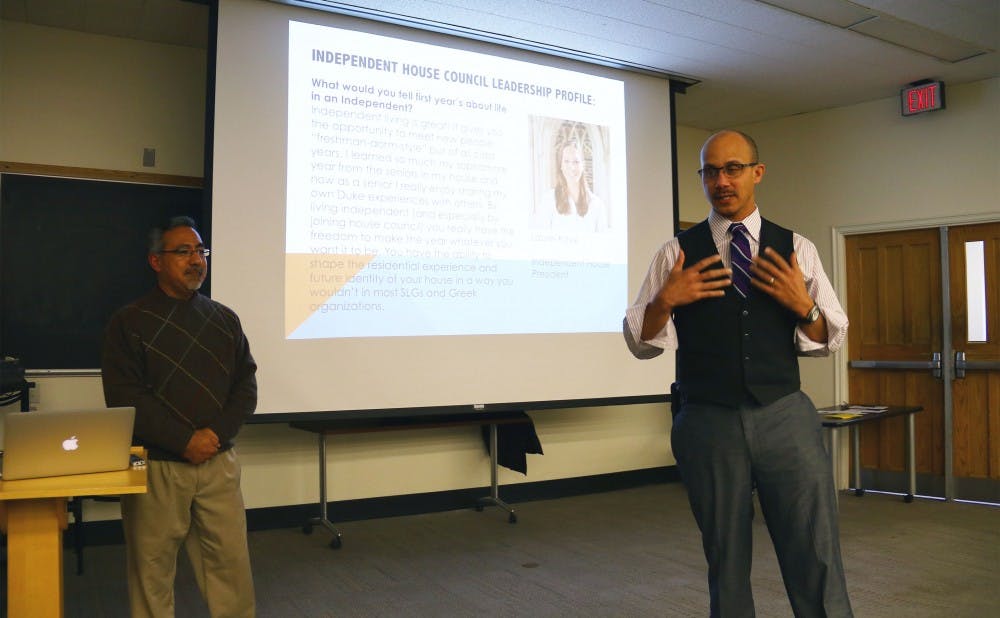The Arts and Sciences Council received an update from the “Imagining the Duke Curriculum” committee about integrating faculty feedback into the new proposed curriculum at its meeting Thursday.
The committee—which began its review of Curriculum 2000 in September 2014—is currently gathering faculty input on the framework for a new curriculum that it laid out at the Arts and Sciences Council meeting Jan. 14. Each department has been asked to submit its feedback by March, which will be followed by discussion and feedback that will ultimately lead to a proposal for the new curriculum, explained Anita Layton, chair of the council and Robert R. and Katherine B. Penn professor of mathematics and biomedical engineering.
“I think we can all agree, the changes we’re discussing are not small tweaks,” Layton said. “To move forward, the committee will need your help and your input.”
She said that a target date for the proposal has not yet been set, noting that the process of gathering faculty input is an iterative one, that “will take as long as it needs to take—no more, no less.”
The review, which is scheduled to take three years, aims to create an undergraduate curriculum focused on what it means for students to receive an interdisciplinary education in the 21st century.
Suzanne Shanahan, chair of the IDC Committee and associate research professor of sociology, emphasized her gratitude for the level of faculty engagement and feedback throughout the review process so far.
“We’ve been delighted by all feedback—the good, the bad and the ugly,” Shanahan said. “They’ve come in equal parts.”
Shanahan said a number of questions have been raised by faculty surrounding the ideas of requiring students to complete five “expectations” before graduation and have two “dual areas of depth”—concepts that were suggested in an outline for the new curriculum during the Council’s January meeting.
The five expectations initially outlined were the ability to communicate coherently; understand other languages, cultures and civilizations; understand different forms of scientific thought and evidence; understand creative products of the human imagination; and evaluate, manage, and interpret information.
Shanahan noted that the committee is currently “taking a bit of a pause” to see how the expectations can best be articulated and implemented in a new curriculum.
She said that other topics that have generated substantive feedback are the major— including if and how the number of requirements for some majors should be lowered—how to improve the advising system and what role the “flipped-classroom” model should have in the new curriculum.
“We’re approaching the feedback in different ways—right now, we’re amassing it, and waiting for a moment where we can aggregate it and come up with a big picture,” Shanahan said. “We’re in a heavy discussion phase.”
In other business:
Joe Gonzalez, dean for residential life, provided an update on the housing program—noting that the "Duke Houses" model, which was rolled out in 2012, has made progress but still has room for improvement.
He said that the goal for the new model—which replaced the "Quad Model" in which sophomores were guaranteed beds on West Campus—was to create "equity in the living experience where all students have similar opportunities and privileges." A cornerstone of the new model is the idea of "right of return"—which allows students to opt to stay in their housing from the year before.
Gonzalez said that the number of students exercising "right of return" is an indicator of the program's success, and so far each year the number of students who have chosen to return to their houses has increased. He also noted that the gap between independent students and those in student living groups in terms of sense of community has decreased under the new model.
"We're trending," Gonzalez said. "Things are going in a good direction, but we haven't reached the place where we think we can get."
Get The Chronicle straight to your inbox
Signup for our weekly newsletter. Cancel at any time.

